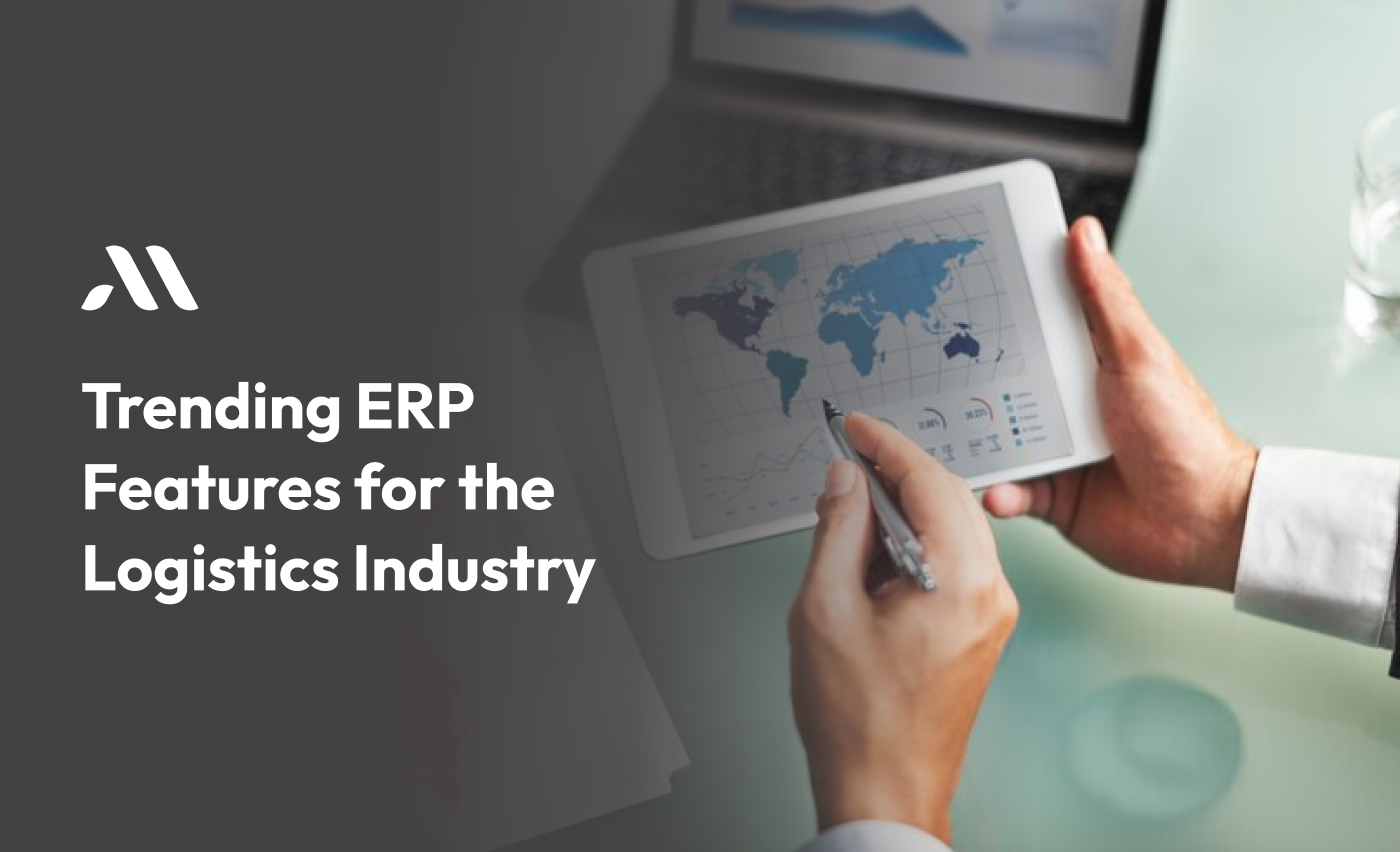The logistics industry is constantly evolving, and staying on top of these changes is key to success. One of the best tools for managing operations efficiently is Enterprise Resource Planning (ERP). ERP systems help logistics companies by simplifying their operations, improving customer service, and cutting costs. In this blog, we'll explore trending ERP features that are making waves in the logistics industry and why they’re important for growth.
What is ERP for Logistics?
ERP (Enterprise Resource Planning) is software that helps businesses manage their day-to-day operations. For logistics companies, it can handle everything from inventory management and order tracking to fleet management and warehouse operations. The latest ERP features are designed to help businesses keep up with increasing demand and provide better customer service.
1. Real-Time Tracking and Visibility
In the logistics industry, knowing where your products are at any moment is essential. Real-time tracking allows logistics companies to monitor shipments, vehicles, and inventory in real-time. This ERP feature helps in improving delivery times, minimizing losses, and keeping customers happy.
Tip: Choose an ERP system that integrates GPS technology for real-time tracking of your vehicles and shipments. This will help you avoid delays and improve customer satisfaction.
2. Automated Inventory Management
Managing inventory manually can be time-consuming and prone to errors. Automated inventory management is a top ERP feature that helps logistics companies track stock levels, reorder products, and reduce human error.
Note: According to a study, companies that implement automated inventory management systems see a 25% reduction in stock errors and a 30% increase in order accuracy.
3. Warehouse Management
For logistics companies, warehouse operations are the backbone of the business. Modern ERP features include warehouse management tools that streamline warehouse activities such as picking, packing, and shipping. These tools help reduce costs and improve efficiency.
Remember: Efficient warehouse management can cut your storage costs by up to 20%, according to industry reports.
4. Fleet Management
Fleet management is one of the most critical tasks in the logistics industry. With ERP features tailored for fleet management, companies can monitor vehicle performance, schedule maintenance, and optimize delivery routes.
"With the help of ERP systems, logistics companies can reduce fuel costs and improve vehicle performance, leading to significant savings."
5. Customizable Dashboards and Reports
Custom ERP systems allow business owners to create personalized dashboards and reports. This feature lets you monitor key performance indicators (KPIs) and make data-driven decisions. With the ability to customize reports, logistics businesses can focus on the metrics that matter most.
Tip: A Custom ERP Development Company can create a system tailored to your specific needs, offering insights that standard software can't provide.
6. Order and Billing Automation
Handling orders and invoices manually can slow down operations and lead to mistakes. With automated billing and order processing, you can streamline these tasks, freeing up time for your team. This is a must-have ERP feature for logistics businesses looking to improve cash flow and reduce administrative work.
Note: Studies show that automating billing and invoicing can reduce administrative costs by 30%.
7. Customer Relationship Management (CRM)
In the logistics industry, maintaining good relationships with customers is crucial. ERP systems now include Customer Relationship Management (CRM) tools that help businesses track customer interactions, improve customer service, and manage client information.
Tip: Integrating CRM into your ERP system will help your team to better understand your customers’ needs and deliver more personalized service.
8. Compliance Management
Compliance with industry regulations is essential for logistics companies, especially when dealing with cross-border shipping and international trade. Modern ERP features include compliance management tools that help businesses stay updated on regulations, reducing the risk of fines and legal issues.
Remember: Non-compliance can lead to hefty fines and legal complications, which could severely impact your business.
9. AI and Machine Learning for Predictive Analytics
Artificial Intelligence (AI) and Machine Learning (ML) are becoming increasingly important in logistics. These ERP features help predict demand, optimize routes, and improve decision-making by analyzing large amounts of data.
"By using AI-driven ERP features, logistics companies can save up to 10-15% on operational costs."
10. Scalability
As your logistics business grows, you need an ERP system that can scale with you. A custom ERP solution is flexible and can be tailored to fit your business needs as they evolve.
Tip: Consider working with a Custom ERP Development Company that can build a solution designed to grow your business.
Also Read - Important Role of ERP Implementation Consultant in Business
Benefits of Custom ERP Development for the Logistics Industry
While off-the-shelf ERP solutions work for many businesses, Custom ERP systems are becoming increasingly popular in the logistics industry. A Custom ERP Development Company can design a system that fits your specific business needs, improving efficiency and giving you a competitive edge.
- Customized Solutions: Custom ERP systems are designed to meet the specific requirements of your logistics business.
- Cost-Effective: While the upfront costs may be higher, a custom system can save you money in the long run by increasing efficiency and reducing errors.
- Flexibility: You can add or remove features as your business grows, ensuring that your system evolves with your needs.
Note: Studies show that businesses using custom ERP solutions experience a 20-25% increase in operational efficiency.
Conclusion
The logistics industry is complex, but with the right ERP features, businesses can streamline operations, reduce costs, and improve customer service. From real-time tracking to AI-powered predictive analytics, these trending features are revolutionizing the way logistics companies operate. Whether you choose an off-the-shelf solution or opt for custom ERP development, investing in a robust ERP system will help your logistics business stay competitive in a fast-paced market.
Ready to boost your logistics business with a custom app? MicraSol specializes in creating powerful apps that streamline your operations. From real-time tracking to fleet management, we've got the solutions you need. Let MicraSol help you grow smarter and faster. Contact us today to get started!
If you're ready to take your logistics operations to the next level, consider partnering with a Custom ERP Development Company to create a solution tailored to your business. With the right tools, you can streamline operations, cut costs, and scale your business efficiently.
FAQS
What is ERP in the logistics industry?
ERP (Enterprise Resource Planning) is software that helps logistics companies manage daily operations like tracking shipments, handling inventory, and managing orders. It simplifies processes to make businesses run smoother.
How does real-time tracking help in logistics?
Real-time tracking is an important ERP feature that shows where shipments, vehicles, and inventory are at any time. This helps reduce delays, improves delivery times, and keeps customers happy.
Why is automated inventory management important?
Automated inventory management makes it easier to track stock levels and reorder products when needed. This feature helps reduce mistakes and ensures you never run out of stock, which is important for smooth operations.
What are the benefits of using ERP for warehouse management?
ERP systems can manage warehouse activities like picking, packing, and shipping. This feature helps logistics companies reduce costs, improve efficiency, and manage storage space better.
How does ERP help with fleet management?
Fleet management ERP features let companies monitor vehicles, plan maintenance, and optimize delivery routes. This helps reduce fuel costs, avoid breakdowns, and ensure deliveries are made on time.








